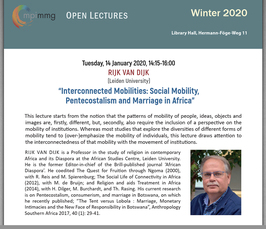"Interconnected Mobilities: Social Mobility, Pentecostalism and Marriage in Africa"
Open Lectures Winter 2020
- Datum: 14.01.2020
- Uhrzeit: 14:15 - 16:00
- Vortragende(r): Rijk van Dijk (Leiden University)
- RIJK VAN DIJK is a Professor in the study of religion in contemporary Africa and its Diaspora at the African Studies Centre, Leiden University. He is the former Editor-in-chief of the Brill-published journal ‘African Diaspora’. He coedited The Quest for Fruition through Ngoma (2000), with R. Reis and M. Spierenburg; The Social Life of Connectivity in Africa (2012), with M. de Bruijn; and Religion and aids Treatment in Africa (2014), with H. Dilger, M. Burchardt, and Th. Rasing. His current research is on Pentecostalism, consumerism, and marriage in Botswana, on which he recently published; “The Tent versus Lobola : Marriage, Monetary Intimacies and the New Face of Responsibility in Botswana”, Anthropology Southern Africa 2017, 40 (1): 29-41.
- Ort: MPI-MMG, Hermann-Föge-Weg 11, Göttingen
- Raum: Library Hall

For more details please contact buethe(at)mmg.mpg.de.
This lecture starts from the notion that the patterns of mobility of people, ideas, objects and images are, firstly, different, but, secondly, also require the inclusion of a perspective on the mobility of institutions. Whereas most studies that explore the diversities of different forms of mobility tend to (over-)emphasize the mobility of individuals, this lecture draws attention to the interconnectedness of that mobility with the movement of institutions. The study of transnational Pentecostalism in Africa has explored the mobility of churches across borders, thus contributing to the exploration of institutional mobility in geographical and cultural terms, yet little attention has been paid to the possible (upward) social mobility these churches experience. While the movement of migrants is often interpreted from the perspective of how and to what extent it ties in with (aspirations of) upward social mobility, the movement of institutions such as churches is rarely interpreted along similar lines. A comparable case can be found in the context of marriage in Africa whereby the interconnectedness of this institution with the movement of people, images, ideas as well as that of Pentecostalism renders marriage as an institution that itself has become the subject of upward social mobility. These differential patterns of mobility reveal particular dynamics and an interrelatedness to one another in ways that transnational studies are well-placed to investigate. The empirical cases used for this particular investigation are drawn from ongoing research in Botswana.